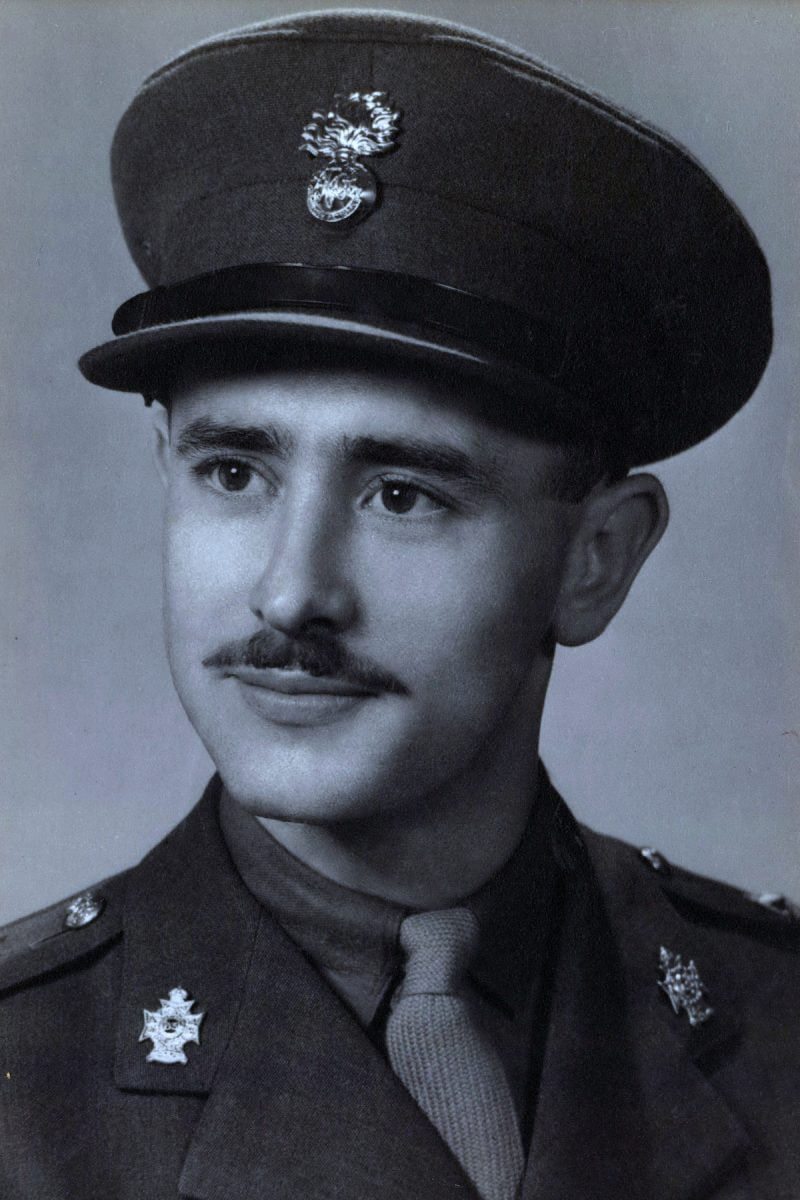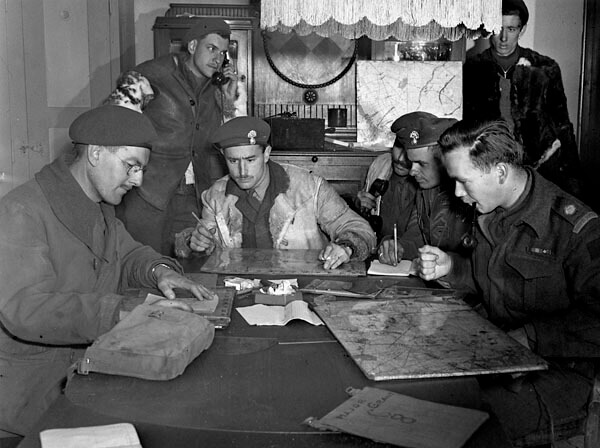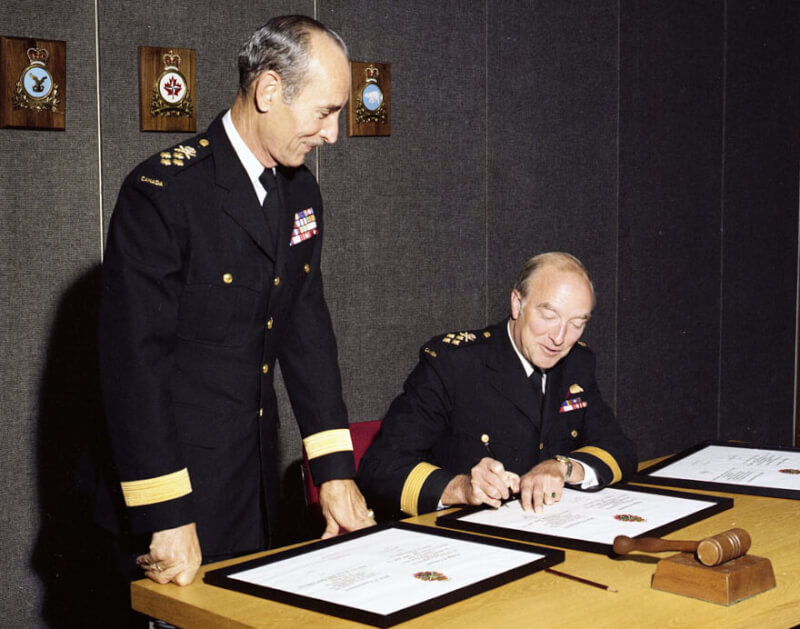
Lieutenant-Colonel Jacques Dextraze. [THE MUSEUM OF THE MONT-ROYAL FUSILIERS]
Hands in pockets, the 25-year-old commander of Les Fusiliers Mont-Royal (FMR) confronted the Nazi general in charge. The latter believed his Canadian counterpart had come to surrender—quite the opposite was true.
Dextraze lit a cigarette, careful not to offer one to the German officer. After a drag or two, he explained that the enemy force was surrounded.
His words, though true, were not enough to convince.
Changing tactics, Dextraze suggested a drive out to see his troop dispositions. There, flanked by a mass of Canadian soldiers at the ready, the Nazi general realized the hopelessness of his situation. He, not Dextraze, conceded defeat.
For his actions, the lieutenant-colonel received a bar to his Distinguished Service Order (DSO), the original having been awarded for leading a frontal assault in the Normandy Campaign. They didn’t call him Mad Jimmy for nothing.
Nor were his exploits over. Far from it.
By the end of his military career in 1977, Dextraze had risen from the army’s lowest rank of private to Canada’s defence chief.

Lieutenant-Colonel Jacques Dextraze (standing, right) interviewed by a CBC war correspondent. [Wikimedia]
Eventually, in what could be described as an early example of his persuasive nature, he managed to secure a place as a private in the FMR.
It didn’t take long for Dextraze to begin his string of promotions, first as a corporal, then as a sergeant prior to his commission as a lieutenant.
Spared from the FMR’s 1942 ordeal in Dieppe, Dextraze’s trajectory continued. By D-Day, he had reached the rank of major commanding ‘D’ Company, distinguishing himself during the subsequent months and, on Christmas Day 1944, being appointed battalion commander.
Following his two-time DSO-earning escapades, Dextraze was given command of The Hastings and Prince Edward Regiment as part of the Canadian Army Pacific Force. Formed to face Japan after victory in Europe, the contingent was stood down when the last Axis bastion capitulated in August 1945.
The Montreal native returned to civilian life, joining the Singer sewing machine company as a forest engineer. Like in the military, Dextraze’s leadership qualities enabled him to soar up the corporate ladder.
That changed in 1950 when the Korean War broke out.
Dextraze was asked to serve once more, now as commander of 2nd Battalion, Royal 22e Régiment (Van Doos), within Canada’s so-called Special Force.
It was while training his men at Fort Lewis, Wash., that Mad Jimmy acquired a new nickname. Aside from his reputation as a strict disciplinarian—not to mention a champion boxer—Dextraze became known for initialling paperwork JDX, which soon evolved into the sobriquet Jadex.
Thrust into the UN line, the Van Doos committed themselves to a conflict of hilltop defence, patrols and, in time, a stalemate increasingly reminiscent of the First World War. Though involved in several operations, it was the battalion’s battle around Hill 355 that came to define its time on the Korean peninsula.
Over four days starting on Nov. 22, 1951, Dextraze’s Van Doos endured repeated Chinese assaults, artillery bombardments and intolerable weather conditions, yet prevailed in their hard-fought defence. Jadex’s leadership skills contributed to the victory, having delivered short and to-the-point orders in the battle’s prelude: “No withdrawal. No platoons overrun. No panic.”
Dextraze’s tour in Korea ended on Dec. 15, 1951. This time, however, he stayed in the military, again rising through the ranks to brigadier. The French Canadian was subsequently appointed commander of Eastern Quebec Area in 1962. His stint there would nevertheless be short-lived.

The tactical headquarters of Les Fusiliers Mont-Royal, April 29, 1945. [CFSJ]
The UN’s peacekeeping force, Opération des Nations Unies au Congo (ONUC), had long been walking a political tightrope when Dextraze arrived in December 1963. Serving as chief of staff at ONUC headquarters, it was hoped that francophone personnel—including Dextraze—could help train the French-speaking Armée Nationale Congolese against insurgents.
Complications surrounding western strategy amid the Congo Crisis remained after Dextraze took up the mantle. More pressing for Jadex was the increasing violence in the Kwilu Province and spreading elsewhere.
Reports of atrocities flooded into ONUC headquarters. It appeared that western aid workers and missionaries were being directly targeted amid the widespread carnage of village burnings, rapes, torture and brutal killings.
Dextraze threw political caution to the wind and acted.
During several weeks starting on Jan. 16, 1964, the chief of staff issued orders for Operation Jadex-1. The British-trained 1st Battalion, Nigerian Army ONUC contingent, made up a considerable proportion of the peacekeeping force tasked with evacuating non-combatants, often while under direct assault.
Dextraze took a hands-on approach to the UN missions. In one instance, with the enemy threatening to overrun the evacuation zone, the Canadian officer kept the insurgents off his S-55 helicopter by engaging them with his Sterling sub-machine gun. Four missionaries were saved before making a hasty withdrawal.
Indeed, hundreds of civilians were rescued during Operation Jadex-1 and the subsequent Operation Stayput. For his service in the Congo, Dextraze was made a Commander of the Order of the British Empire.
Additional military appointments awaited Jadex back home in Canada. Unfortunately, his latest ascent was tinged with the loss of his son, Richard Paul Dextraze, who had died in the Vietnam War while serving with the U.S. Marine Corps.

Signing of parchments during the change of command of the chief of defense staff between General Jacques Dextraze and Admiral Falls, Aug. 31, 1977. [CFSJ]
When a 73-year-old Jacques Dextraze died of cancer on May 9, 1993—31 years ago this week—he left behind a legacy as a true soldier’s soldier from bottom to top of the military ladder. Criticism found him en route, notably his demanding nature and, post-career, his views against women in combat roles.
Despite these controversial qualities, he never ceased to command respect. Whether in the Normandy bocage, the Korean hills, the Congolese jungle, or the policy-making halls of Ottawa, Dextraze climbed the highest he could.
Advertisement






















